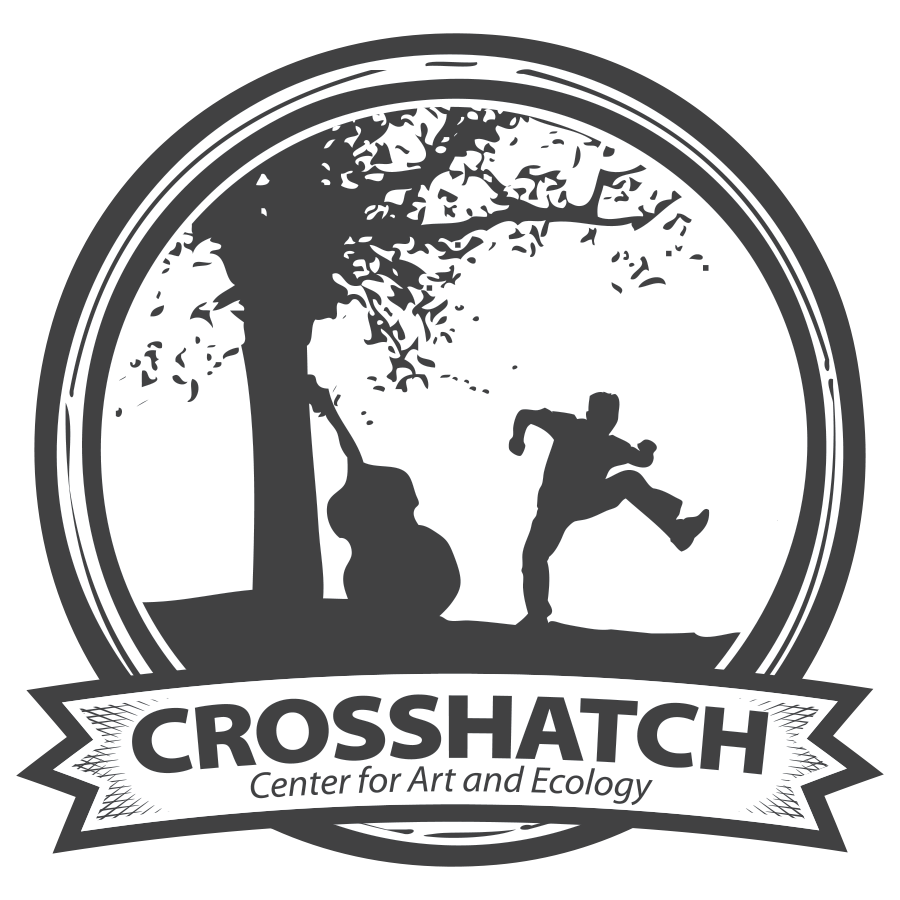Digital Art (for t-shirt design) • 2023 • Brad Kik for May Erlewine
In This Issue: What is a land based project and why do I want in? Part 1 of a series on shifting our culture toward ecological ways of being in the world, by Brad Kik.
Holding the Center: Building an Institute for Art and Ecology (and other land-based projects)
Part 1 of a series on shifting our culture toward ecological ways of being in the world.
What do these projects — outdoor music festivals, folk schools, nature centers, eco-villages, community gardens, retreat centers, camps, and farmer training programs — have in common?
Without getting too broad, let’s say that these are projects that take place on the land, that are integrated into the surrounding ecological and social environment, that are run by communities, smallholdings, farms, organizations, or businesses, and that often encompass more than a single building or service. That’ll have to hold for now. No doubt there are exceptions: Woodstock ’99 was definitely an outdoor music festival but failed utterly at integrating into either the ecological or social environment.
Done well, though, land-based-projects like these are an essential and under-valued part of our communities, and perform a host of key functions that we can’t live well without. To name a few: ecological education, creating safe space for gatherings of all kinds, creating abundant opportunities for people to connect to the natural world, often in life-altering ways. My favorite: hosting a diversity of programs such that interesting connections between them are revealed and celebrated. They are the best kind of community center — they hold the values of a community, but in a more interesting setting than institutional “concrete block” community centers, and they might expand their notion of community to include the non-human members of a place.
This is the “holding the center” mentioned in the title. The rest of the title is “building an institute for art and ecology (and other land-based projects),” in case you are interested in creating something similar. I’ve included some first-steps, which you’ll find at the end of the essay.
The Warp — Ideas and Inspiration
|| 1 || Welcome Ada Reed! Taylor and Jess have a beautiful baby, and they’re doing great. Taylor will be out for a bit as he enjoys getting to know this amazing new human.
|| 2 || This break is a great chance for me (Brad) to polish and publish some writing. Your thoughtful feedback is welcome. The above essay synthesizes two topics that have been interesting to me—first, the idea of building a land-based-projects network in Michigan. To that end, in case you didn’t make it to the end of the essay yet, here’s the last paragraph:
…if you are running or would like to run a program that meets the definition of a land-based-project, we’d love to hear from you! We’re currently building a state (of Michigan)-wide network of LBPs (and yeah, we really need a better name), with hopes of doing all the things networks do so well — sharing information, experience, and other kinds of emotional, logistical, political and material support, creating a group of people to talk shop with and reach out to with weirdly specific questions, and of course offering ways for convening, mentorship, land tours, and on and on. Start by filling out this form, and then share this essay and this link with others you know doing this work!
And second, thinking about the role of institutions in doing this kind of work. I’m compelled by anarchist critique of institutions as a whole (often in contrast to mutual aid work), and I admit this essay is a bit of a “not all non-profits” take. I agree with many of the systems-level critiques of the non-profit industrial complex, such as those found in the book The Revolution Will Not Be Funded: Beyond the Non-Profit Industrial Complex, as well as the books Decolonizing Wealth and Winners Take All: the Elite Charade of Changing the World. Exceptional analysis couched in good humor can be found at the website Nonprofit AF. Whether you are a donor, a board member, on staff, or just interested in diving deeper around the dynamics of a major component of our economy and culture, these are great reads.
|| 3 || In the last newsletter, Taylor quoted Norman Borlaug, the father of the Green Revolution, saying: “Some of the environmental lobbyists of the Western nations are the salt of the earth, but many of them are elitists. They've never experienced the physical sensation of hunger. They do their lobbying from comfortable office suites in Washington or Brussels. If they lived just one month amid the misery of the developing world, as I have for fifty years, they'd be crying out for tractors and fertilizer and irrigation canals and be outraged that fashionable elitists back home were trying to deny them these things.”
Norman Borlaug features as “the Wizard” in the remarkable book “The Wizard and the Prophet” by Charles C. Mann (who you might remember as the author of 1491: New Revelations of the Americas Before Columbus and 1493: Uncovering the New World Columbus Created).
“Prophets look at the world as finite, and people as constrained by their environment. Wizards see possibilities as inexhaustible, and humans as wily managers of the planet. One views growth and development as the lot and blessing of our species; others regard stability and preservation as our future and our goal. Wizards regard Earth as a toolbox, its contents freely available for use; Prophets think of the natural world as embodying an overarching order that should not casually be disturbed.”
The real gift of Mann’s book is its refusal to proclaim a firm conclusion, and instead requires you to get past slogans and pithy quotes and into the meat of the question of which path forward we should take.
|| 4 || Taylor ponders questions connected to appropriate technology and technological criticism, which I appreciate. I also appreciate applying no- and low-tech arguments to the internet, which might seem nonsensical but makes good sense. This Page is Designed to Last is a manifesto for preserving content on the web. It started with the author, Jeff Huang, decided to clear out his old bookmarks. “Bookmark after bookmark led to dead link after dead link.”
He offers seven unconventional guidelines to help your website stay up for “at least 10 years, maybe even 20 or 30 years.” His list (covered in much more detail on his page):
Return to vanilla HTML/CSS
Don't minimize HTML
Prefer one page over several
End all forms of hotlinking
Stick with native fonts
Obsessively compress your images
Eliminate the broken URL risk
Also see his post My productivity app is a never-ending .txt file: “My current file was created 9 years ago when I started my current job. It serves as a research notebook, and as meeting minutes. I have 51,690 handwritten lines in one file now, documenting everything I have done as a professor, and nearly every person I have met with, along with notes about what we discussed or ideas I had.”
Ope! And I decided to open six random old bookmarks as a test—three either failed to load or loaded a message like “Oops! That page can’t be found.” Two defaulted back to a generic page or the home page. Only one out of six actually showed me the content I had bookmarked a long time ago.
The Weft — News and Events
|| 1 || Registration opening soon for the Northern Michigan Small Farm Conference!
Northern Michigan Small Farm Conference
Monday, August 14, 2023
from 10:00 AM to 5:00 PM
Save the date—the Northern Michigan Small Farm Conference will be held on Antrim County farms on Monday, August 14th, with additional events on Sunday the 13th and Tuesday the 15th. Tickets will be just $25, and include a year of access to the online hub.
|| 2 || Other Food and Farming Dates:
Tuesday, July 25: Buckwheat, Bees, Bacon, and Barley: Small-scale row crops, on-farm livestock, and cover cropping. 6 to 8 pm, at Hill Valley Farm in Charlevoix, MI.
On this tour, we will discuss ways to increase the diversity of farm products and income streams. Ben and Brittany McMurray will share their experiences in year-round stewardship for pastured pigs. They will showcase synergies between crop production and livestock. This Twilight Tour is free but please register.
Heritage Breed Microgrant. The Livestock Conservancy has an array of microgrants now open for applications until August. If you work with heritage livestock or poultry, it’s likely worth a perusal to see if any of the categories might fit the needs of your operation. Information available here.
|| 3 || Writing Dates:
Tuesday, August 22: Write Here, Write Now: The Antrim Writers Series
7 to 8:30 pm, at Bee Well Mead & Cider in Bellaire
Join us for an author presentation by Anne-Marie Oomen. Anne-Marie will be releasing her newest book "The Long Field" at this event. This program is part of the Antrim County Visiting Authors' Series "Write Here, Write Now," a collaborative project between Crosshatch Center for Art and Ecology, Elk Rapids Public Library, Bellaire Public Library, and funded by a grant from the Grand Traverse Rotary Charities.
Registration only required if you wish to receive a free copy of The Long Field. You must be present at this program to receive a copy, limited to the first 25 registrants.
Wednesday, August 23: Memoir Writing Workshop with Anne-Marie Oomen
2:30 to 4:30 pm at the Bellaire Public Library in Bellaire.
Limited seats are available, so register early. Ages 16+. No charge for this event, thanks to the generous support of Grand Traverse Rotary Charities.
|| 4 || Music at the Alluvion between now and the full moon:
Monday, July 17th: Funky Fun Mondays with Funky Uncle
Thursday, July 20th: The Plate Scrapers with special guest Slim Pickins
Monday, July 24th: Funky Fun Mondays with Big Fun
Sunday, July 30th: Jordan Hamilton Duo with special guest Gail
Monday, July 17th: Funky Fun Mondays with Funky Uncle
sponsored by:
Desmond Liggett Wealth Advisors is a mission-driven, fee-only wealth management company with a simple purpose: to generate exceptional value for the individuals, families, small business owners, and non-profit organizations they serve. Desmond Liggett Wealth Advisors believe in and adhere to triple-bottom-line analysis for portfolio investments, ensuring that they review how a company’s environmental and social values impact its long-term resilience and, consequently, value.
Many thanks to the Michigan Arts & Culture Council and the National Endowment for the Arts for their support of this work.
Crosshatch’s The Whole Field is a biweekly newsletter. We aim to provide content that’s engaging, thought-provoking, and worth your time. If you’ve been forwarded this email, and want to receive future editions, click here to subscribe to our mailing list or view previous editions.
We also envision this best as a collaborative work. If you have any suggestions, leads or feedback, we appreciate your reply directly to this email.
Copyright (C) 2023 Crosshatch. All rights reserved.









